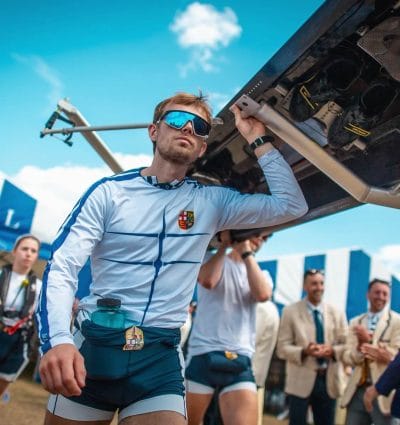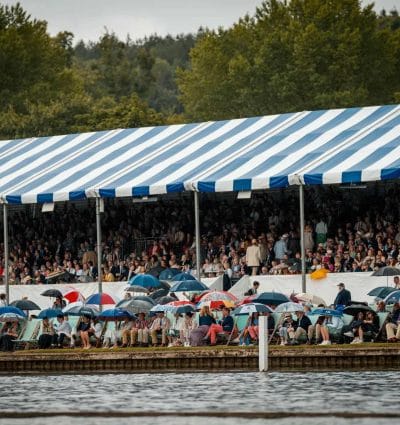
The Henley Royal Regatta is one of the most prestigious sporting events of the year, a true symbol of tradition, elegance, and excellence in rowing that returns next July 1st. Held on the banks of the historic River Thames, the regatta attracts not only the world’s top rowing teams but also passionate fans of the sport and a discerning audience who value the exclusive experience the event offers.
However, recently, growing concerns about water quality have caught the attention of the media, authorities, and attendees. Recent reports on Thames River pollution levels and the environmental impact of the Henley Royal Regatta have prompted an immediate response from the organizers. Far from ignoring the issue, they have strengthened their ecological commitment through concrete actions and green initiatives, such as post-event clean-up campaigns, waste management plans, and collaborations with environmental organizations.
This responsible approach not only aims to protect the natural setting that frames the regatta but also fosters a new awareness around the sustainable hosting of elite sporting events, extending to every related service, from logistics and event planning to private transportation and VIP guests’ transfers.
A Centuries-old event looking to the future
With over 180 years of history, the Henley Royal Regatta is far more than a rowing competition; it is a true institution in the United Kingdom and one of the most iconic events on the British social calendar. Founded in 1839, it has witnessed generations of athletes, spectators, and families coming together summer after summer in Henley-on-Thames to celebrate a sporting and social tradition that blends competitive excellence with elegance.
The Henley Royal Regatta has successfully preserved its unique identity, becoming a global benchmark in rowing and an unmissable event for both sports enthusiasts and those who appreciate the cultural and social experience that surrounds it. Still, its historic character doesn’t prevent its organizers from looking ahead, particularly when it comes to protecting the natural environment.
Recently, the Regatta has made headlines not only for its exclusivity and refined atmosphere but also for environmental concerns associated with the condition of the River Thames. Significant levels of pollution have been detected, partly due to wastewater discharges, leading to health warnings for participants, especially due to the presence of bacteria such as E. coli.
This situation has brought an urgent need for action to the forefront. And it is precisely this awareness that has driven a shift in the event’s approach. Today, the Henley Royal Regatta looks to the future with a firm commitment to sustainability, striving to balance its rich heritage with the responsibility of preserving the environment that hosts it.


Can the Henley Royal Regatta be sustainable?
Sustainability is one of the greatest challenges when it comes to organizing large-scale events. Even long-established and complex events like the Henley Royal Regatta are not immune to this reality. Each edition brings together thousands of attendees, athletes, technical teams, media outlets, and sponsoring companies. This creates a major logistical challenge that inevitably leaves an environmental footprint, from transportation from London and energy consumption to waste generation and the impact on the river ecosystem.
In this context, is it possible to combine exclusivity, tradition, and sustainability? The answer is clear: today’s attendees and sponsors are more aware and demanding when it comes to environmental impact. They expect actions and real commitments. Sustainability is no longer an external concern; it is now an integral part of every decision and action taken by the event organization.
Efficiency, emissions reduction, and conscious resource management are all core to our approach at Drivania, especially in demanding settings like this, where excellence is also measured by the ability to generate a positive impact.
Ecological initiatives at Henley Regatta: beyond promises
The Henley Royal Regatta has begun implementing sustainable actions that reflect its commitment to the planet, integrating environmentally responsible practices into every aspect of the event. Some of the most notable initiatives include:
- Post-event clean-up: once the competition concludes, a dedicated clean-up program is activated to remove any waste from the natural surroundings, with special attention to the Thames River. This measure reflects an ongoing and active commitment to protecting the river ecosystem that defines the event.
- Waste management with Grundon: the organization partners with Grundon Waste Management, a company specializing in sustainability, to ensure proper waste management at the Henley Royal Regatta. Through an efficient sorting system, waste is recycled, composted, or converted into energy, significantly reducing the event’s environmental impact.
- Reduction of single-use plastics: clear restrictions have been implemented on disposable plastic use within the event grounds, promoting biodegradable materials, reusable cups, and compostable packaging. This initiative aims to reduce non-recyclable waste and foster a more conscious consumption culture among attendees and vendors.
- Collaboration with sustainable brands and suppliers: the Regatta prioritizes partnerships with companies that share its ecological vision, such as Henley Naturals and local sustainable food providers. This approach not only lowers the carbon footprint associated with logistics but also ensures an experience aligned with the environmental values of today’s audience.
Our sustainable experience, extended to mobility
The Henley Royal Regatta welcomes thousands of visitors, including competitors, guests, and fans, making mobility a key aspect of the event. The area’s features, with wide pedestrian zones, temporary traffic restrictions, and limited access in Henley-on-Thames, make advanced transportation planning not just recommended, but necessary.

In this context, private transportation services during the Henley Royal Regatta offer an alternative that is not only comfortable and efficient but also more environmentally responsible. Unlike other models based solely on demand-based transfers, Drivania focuses on the strategic planning of private transportation, reducing unnecessary trips and optimizing every route and journey to minimize the carbon footprint.
Our mobility proposal is not based solely on comfort or punctuality. What sets us apart is our real and measurable commitment to sustainability. Through our Carbon Offset Program, we have offset all CO₂ emissions from services performed in 2024. This compensation was achieved through our participation in a renewable energy project in the state of Gujarat, India, certified by the Gold Standard (GS). This international certification—established in 2003—is one of the most recognized worldwide for greenhouse gas offset projects, ensuring that emission reductions are real, verifiable, and accompanied by tangible benefits for sustainable development and local communities.
This milestone is not a starting point but an accumulated achievement. At Drivania, we have audited and verified in our Sustainability Report how we have compensated for all emissions from our founding in 2001 through the end of 2024. More than two decades of operations with compensated environmental impact, reflecting not only commitment but also leadership in the mobility sector.
At an event where sustainability flows from the banks of the Thames to every logistical detail, the transportation experience must equally reflect today’s values and tomorrow’s demands.